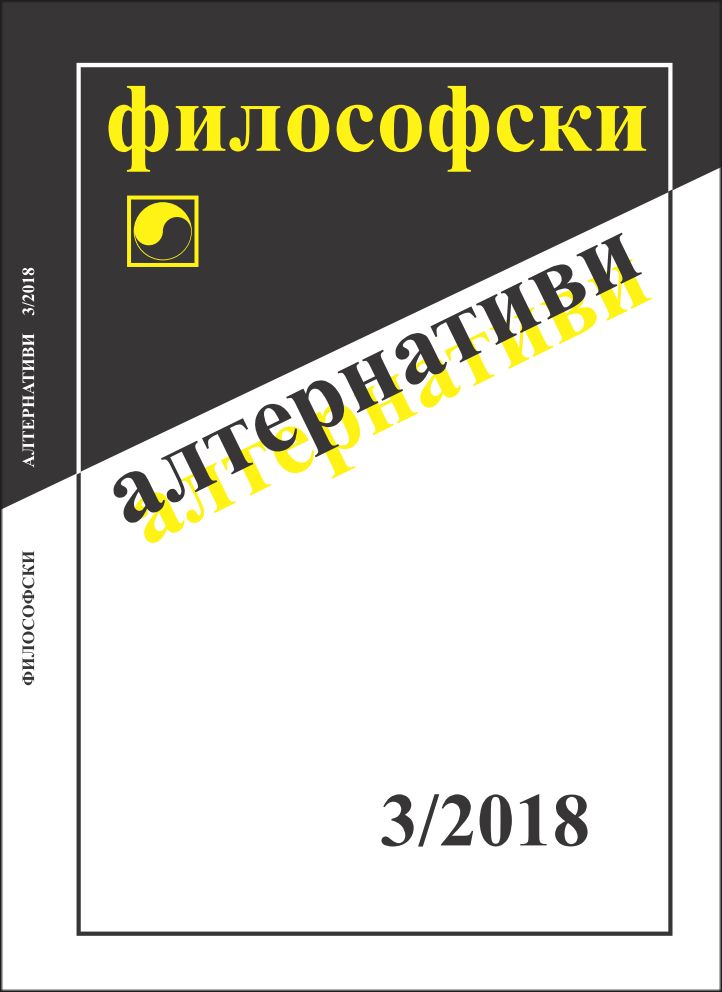
We kindly inform you that, as long as the subject affiliation of our 300.000+ articles is in progress, you might get unsufficient or no results on your third level or second level search. In this case, please broaden your search criteria.

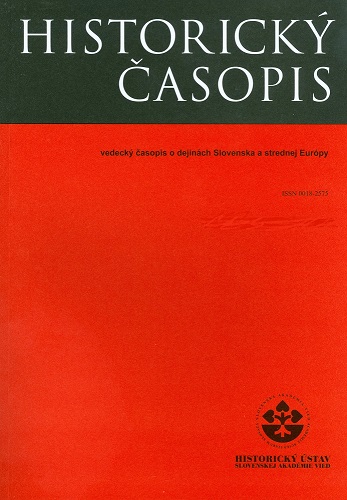
The review of: HORSKÝ, Ján. TEORIE A NARACE. K noetice historické vědy a teorii kulturního vývoje. Praha: Argo, 2015, 274 s. ISBN 9788025713204.
More...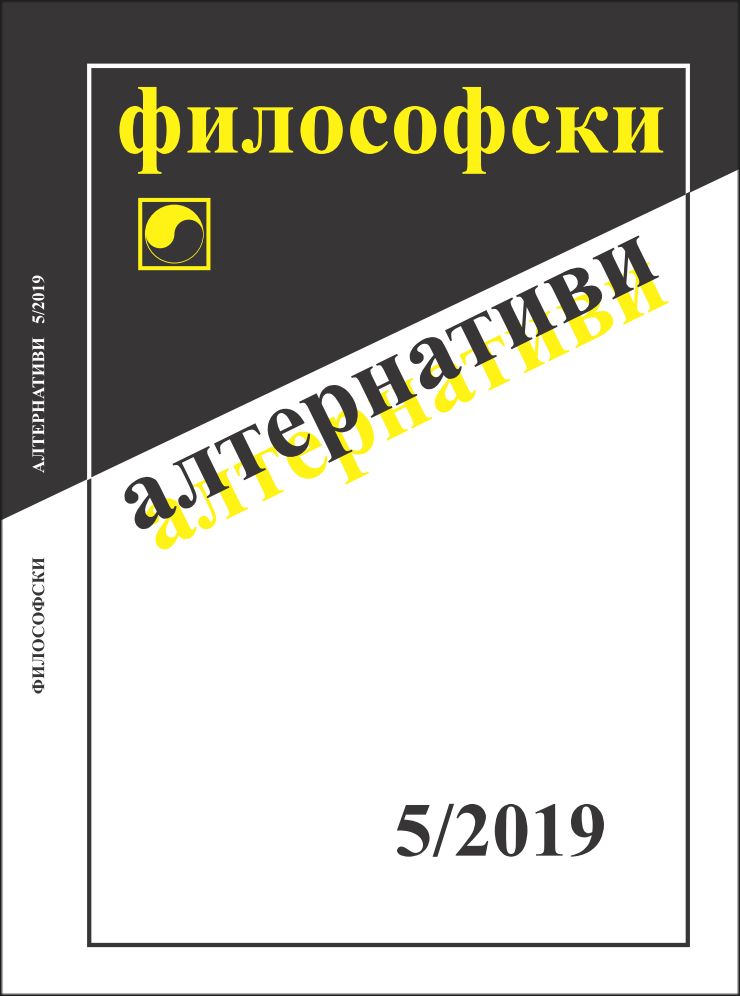
In this paper, I turn my attention to two main topics: first, the French Revolution of 1789, which began 230 years, and second, a brief history of the pamphlet. A study of the relationship between these topics sheds light on the intellectual history of modern political thought. On the one hand, we thus discover some leading directions in the development of the media of the written word, which may give rise to divergent and contradictory ideas in the impartial observer. On the other, we stand before the imposing view of the modern political revolution as an epoch-making event involving complete denial of the past system of religious, moral, and juridical values in the name of the people’s all-embracing liberty, defined as the most important value by the radical Enlightenment philosophers in the second half of the eighteenth century.
More...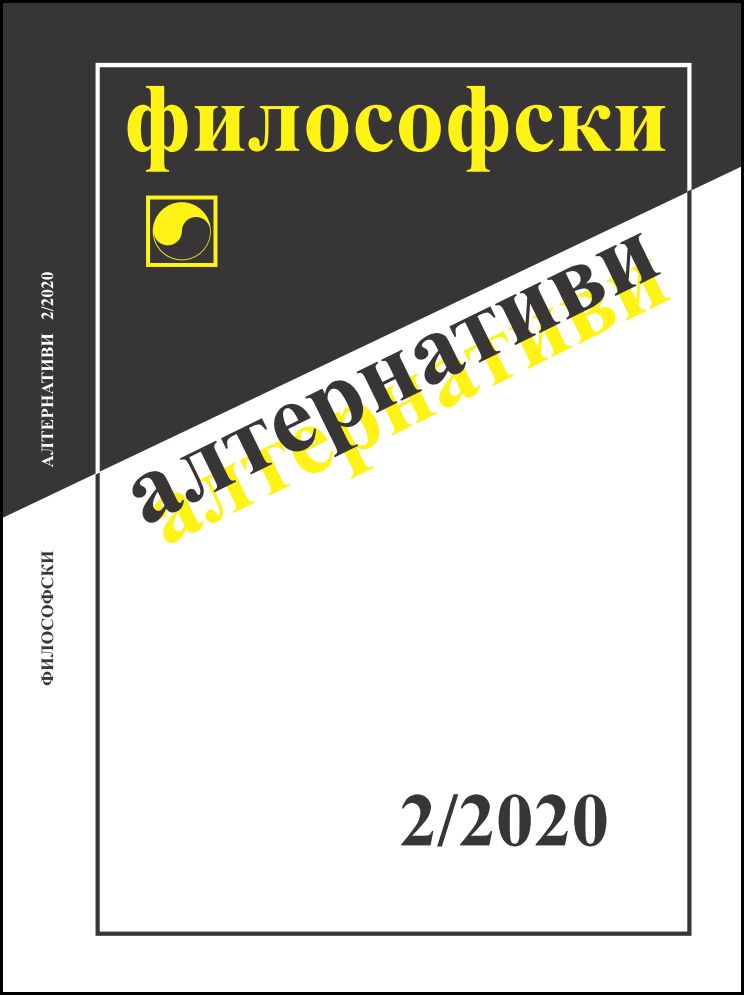
The article presents new facts and original analyses of the donation activities and the Wills of Dr. Petar Beron. A number of confirmed opinions about specific donations, teacher support, etc., are found to contain serious omissions and inaccuracies. Many important, but hitherto supressed or unknown, data about abuses involved in the donations are pointed out and analyzed in detail ford the first time in the article. The author reveals so far unknown, or barely touched upon, aspects of the social, political, and economic context of the Wills.
More...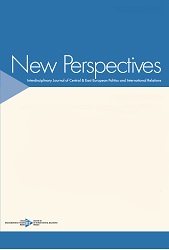
Thou art perfect then our ship hath touched upon the deserts of Bohemia?” asks Antigonus in act 3, scene 3, of William Shakespeare’s The Winter’s Tale (1609-10). Czechs are inclined to see Shakespeare’s furnishing of their country with a coastline as a typical example of foreigners’ ignorance of their land, which was to reach its shameful nadir in British Prime Minister Neville Chamberlain’s description of Czechoslovakia in 1938 as “a faraway country” inhabited by quarreling peoples “of whom we know nothing.” Such flights of geographic fancy can rankle with those unlucky enough to have to suffer their consequences; Chamberlain was distancing the Czech lands from the known world in order to justify his acquiescence in Adolf Hitler’s carving them up. Shakespeare, however, was probably doing no more than signaling that the second part of his fable was set in an imagined Arcadia, a realm of youth and innocence located at the opposite moral pole from the world-weariness, sophistication, and decadence of the equally fictionalized Sicilian court in which the play begins. [...]
More...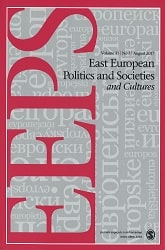
This article investigates how the Holocaust was recollected, presented, and interpreted in Ukraine and Belarus during the Soviet era. It further examines the changes that have taken place in the representation of the Holocaust in Ukraine and Belarus in the postcommunist period. First, the article aims to explain the ideological reasons why the Jewish origin of many Nazi victims was largely played down or ignored in the Soviet historiography. Second, it investigates the new political dynamics in independent postcommunist Ukraine and Belarus that have influenced public discourse and historiographical reflections on various issues of the Second World War, including the persecution of the Jews. As well as historiography, the article investigates the developments that have taken place in contemporary Ukraine and Belarus regarding commemorative practices, monuments, museum exhibitions, and education initiatives to honor the victims of the Holocaust and to promote knowledge about this event.
More...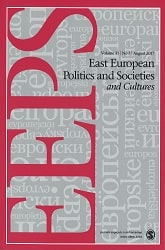
What is the power of the powerless today? By drawing on the philosophy of history that informed Havel’s landmark essay, this piece presents notes for a possible sequel. It assesses the contemporary state of what Havel’s mentor, Jan Patočka, called “technological civilization,” particularly with respect to the growing linkage Patočka perceived between boredom (a product of this civilization) and orgiastic violence. Reflecting on the Havelian panoramas of our time and the ideologies associated with them, the piece situates our present in the multimillennial Patočkan history of human beings’ relation to meaning, violence, and responsibility. Following the logic behind Patočka’s and Havel’s Cassandra-like warnings from the 1970s, the piece concludes by confronting the increasing probability of global catastrophe, but it takes inspiration from their work to outline a program of responsible hope.
More...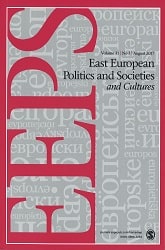
The article proposes an interdisciplinary introduction to the notion of the political world as farce. More exactly, it advances the argument that, despite experiencing the world as a joke of cosmic proportions, an individual can still create meaning even in the most meaningless conditions (concentration camps, totalitarian societies, etc.). The article traces the presence of the topic in Dostoevsky’s The Brothers Karamazov and Primo Levi’s Se questo è un uomo and discusses the particular case of Milan Kundera, for whom the historical world appears as nothing but a cruel joke. The treatment of the topic is framed in relation to the theologia ludens tradition, the theatrical elements of Communism, as well as the process of meaning creation in conditions of meaninglessness.
More...
More than twenty years after the fall of the Berlin Wall and the disintegration of the Soviet empire in Eastern Europe, the region is still grappling with the problem of its new identity and the choice of an appropriate name to reflect it. There has been considerable talk about a “return to Europe,” as well as the emergence of a “new Europe” and, as a consequence of the latter, the birth of a “new Eastern Europe.” Ukraine, Belarus, and Moldova are often viewed as the core of the “New Eastern Europe.” These countries have recently found themselves in a unique geopolitical position, sandwiched between the extended European Union in the west and Russia in the east. They had never been thought to constitute a distinct region and thus had no established group identity. This article explores the question of whether looking at the history of Ukraine, Belarus, and Moldova as that of one region can help us better understand its past and explain its current situation.
More...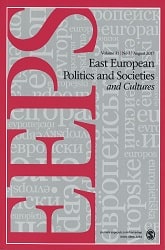
The language of history, more than any other systematic approach to knowledge, is subject to diverse, often contradictory interpretations. Lacking a rigorous scientific conceptual apparatus, it operates within the rather loose and changeable, albeit imaginative and often beautiful, conceptual pool of everyday speech. Although most historians are quite aware of this problem, hardly one in a hundred risks spoiling a nicely outlined presentation with a pedantic introduction on definitions. Taking the risk, I should like to begin with a definition of the key notion I use throughout this analysis answering the question: What is a myth? [...]
More...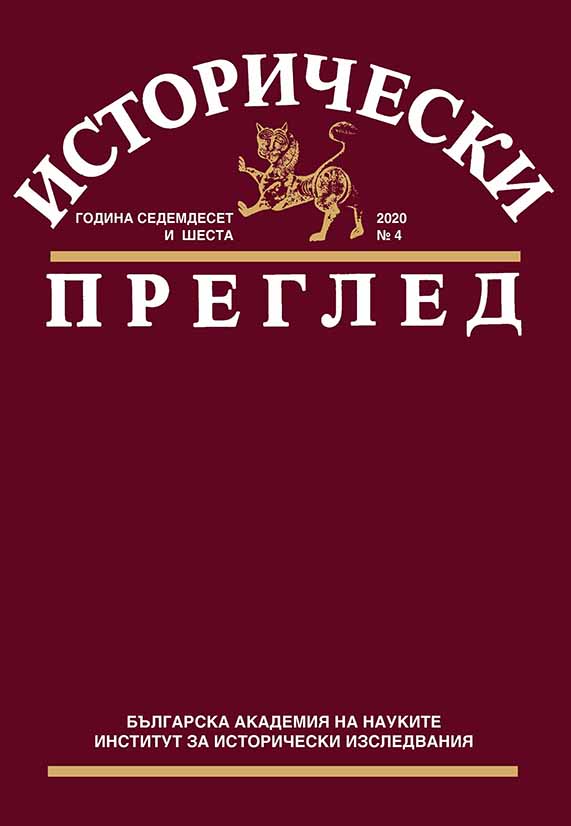
Blessed Augustine was the progenitor of the theological philosophy of history. In the first half of the fifth century, he used several texts by Eusebius of Caesarea (260– 340), considered the founder of patristic historiography, but mostly of the Chronicle of the Beginning of the World, by Sulpicius Severus, and Seven Books of History Against the Pagans by Paulus Orosius. His historiosophical theses are embedded in the work “On the City of God”. Here he proposes a theory of history oriented toward the future, not the past. He united the heuristic Hellenistic chronology and historical tradition with Christian historicism, which led to the formation of the Christian philosophy (more precisely – theology) of history. He also sharply opposed some Christians who, because of the fall of the “fourth kingdom”, foretold the “end of the world”. At this point his “idea of time” and the notion of the essence of the state (kingdoms – divine and secular) are very useful. And therefore his work is considered the real beginning of a new stage in historical thought, known as “medieval historiography and historiosophy”.
More...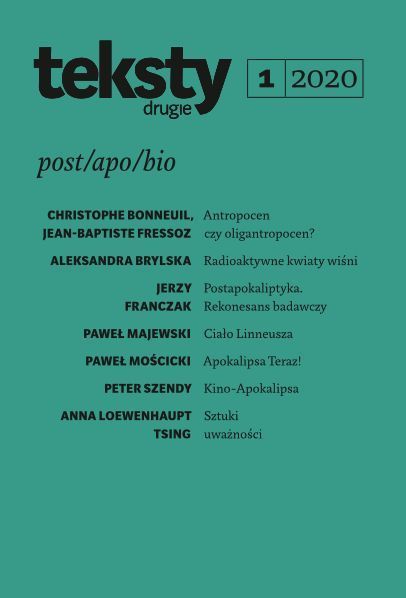
Bendyk discusses two interpretations of violence and its sources. The first refers to René Girard’s mimetic theory, where violence is a product of religion and culture; and the second stems from the Enlightenment, which presents violence as a product of human rationality. In Girard’s interpretation the apocalypse is a real option for the end of history, the second one leads to enlightened catastrophism, which removes the necessity of the apocalypse.
More...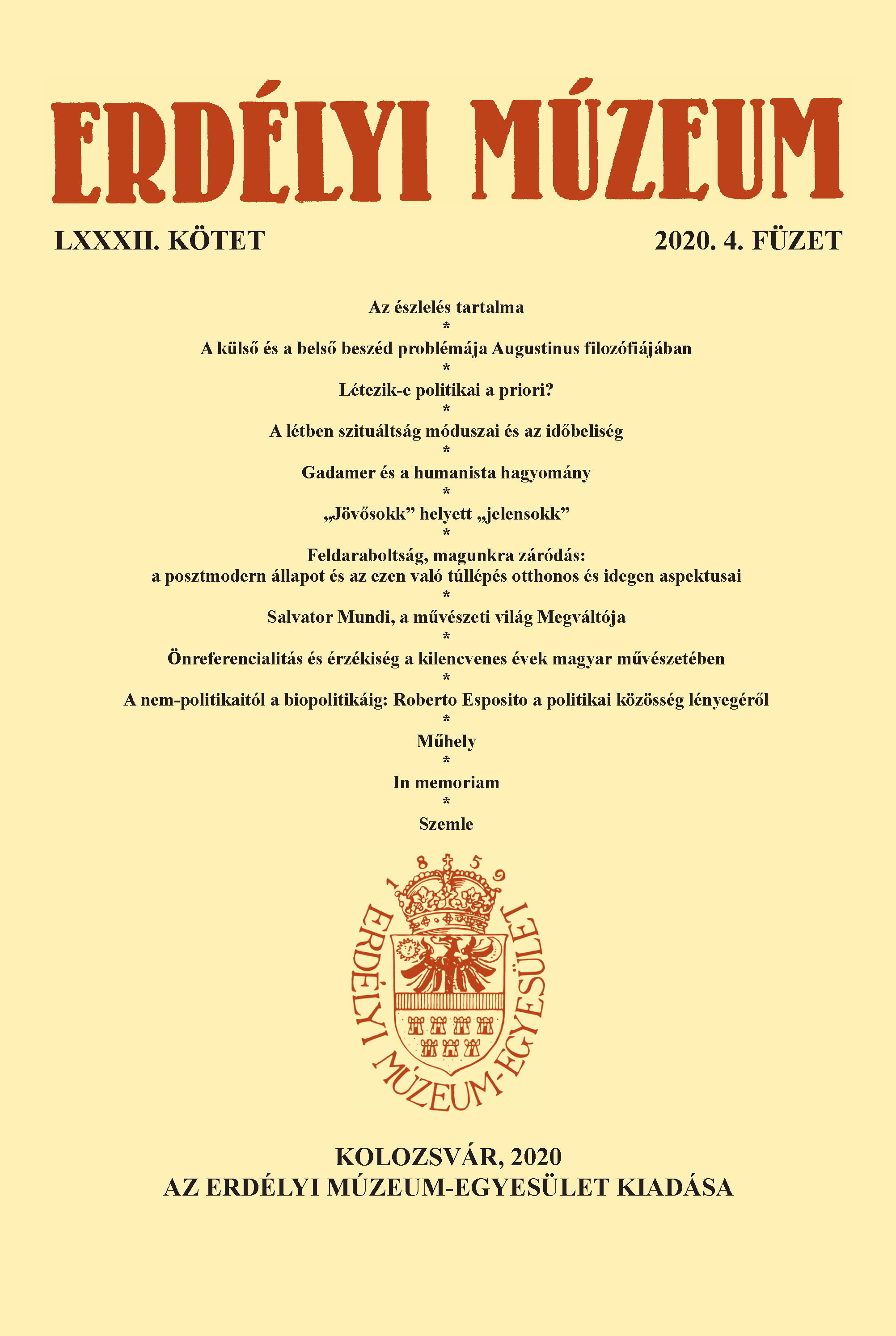
In my paper, I examine the meaning and significance of the more widely interpreted humanist tradition for Gadamer. I apply the ’wide’ attribute because on the one hand the interpretation of the tradition itself by Gadamer raises important aspects, on the other hand I also deal with Gadamer’s interpretation of myth, in addition to “humanist leading concepts”. In my paper I deal with the following questions: the human sciences and the humanist tradition – methodological reflections; the main characteristics of the interpretation of the concept of “formation” (Bildung) by Gadamer; common sense, taste and judgment as “humanist leading concepts”; the historical aspects of the meaning of myth; myth and logos; myth and reason; myth and science.
More...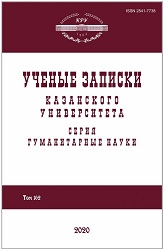
In the paper, the most important and resonant episodes of M.N. Pokrovsky’s “rehabilitation” as a researcher were studied. Based on the analysis of various published and unpublished sources, a number of conclusions were drawn. Firstly, the period of late 1950s – 1960s was marked by the rejection of the previous assessments of M.N. Pokrovsky’s legacy that became popular in the historiography of the Stalin era at the level of party and political discourses, as well as among researchers. Secondly, historians proposed different models for studying M.N. Pokrovsky’s legacy; the ubiquitous feature of all models was the use of archival sources. The “living memory” and personal experience of the academic community served as an integral supplement to the “cold” documentary facts. Thirdly, the active participation of Soviet historians in returning of M.N. Pokrovsky to the historiographic pantheon was of great importance. M.V. Nechkina, E.A. Lutsky, and A.L. Sidorov were among them. Interestingly, they were among the authors of an earlier published two-volume edition against M.N. Pokrovsky. At the same time, the limits of what was “acceptable” or not were still defined by the government authorities. This influenced the presentation of scientific knowledge to the professional community.
More...
The methodology for studying nations and nationalism in modern Russian historiography was analyzed. The concept of Russianness was considered, and, as a result, it was demonstrated that the scope of tools and methods used in intellectual history can be expanded. The scientific and research discourse of the notions of nation, nationalism, and, in particular, Russianness was outlined. The conceptualization of the latter – in the works by A.I. Miller, M.D. Dolbilov, and E.A. Vishlenkova – was considered. The limits of the concept were defined. Its place in the historiographical notions of nation and nationalism, identity and empire was revealed. The intentions of the authors of historiographic statements were identified based on the works published by the Cambridge School of Intellectual History. The biographical approach was used: the role played by personal views of a researcher, which inevitably humanize the history of historiography, was discussed. Special attention was paid to cognitive metaphors enabling both deconstruction of the meaning of statements and identification of the content of their internal structures, such as ideologemes or frames.
More...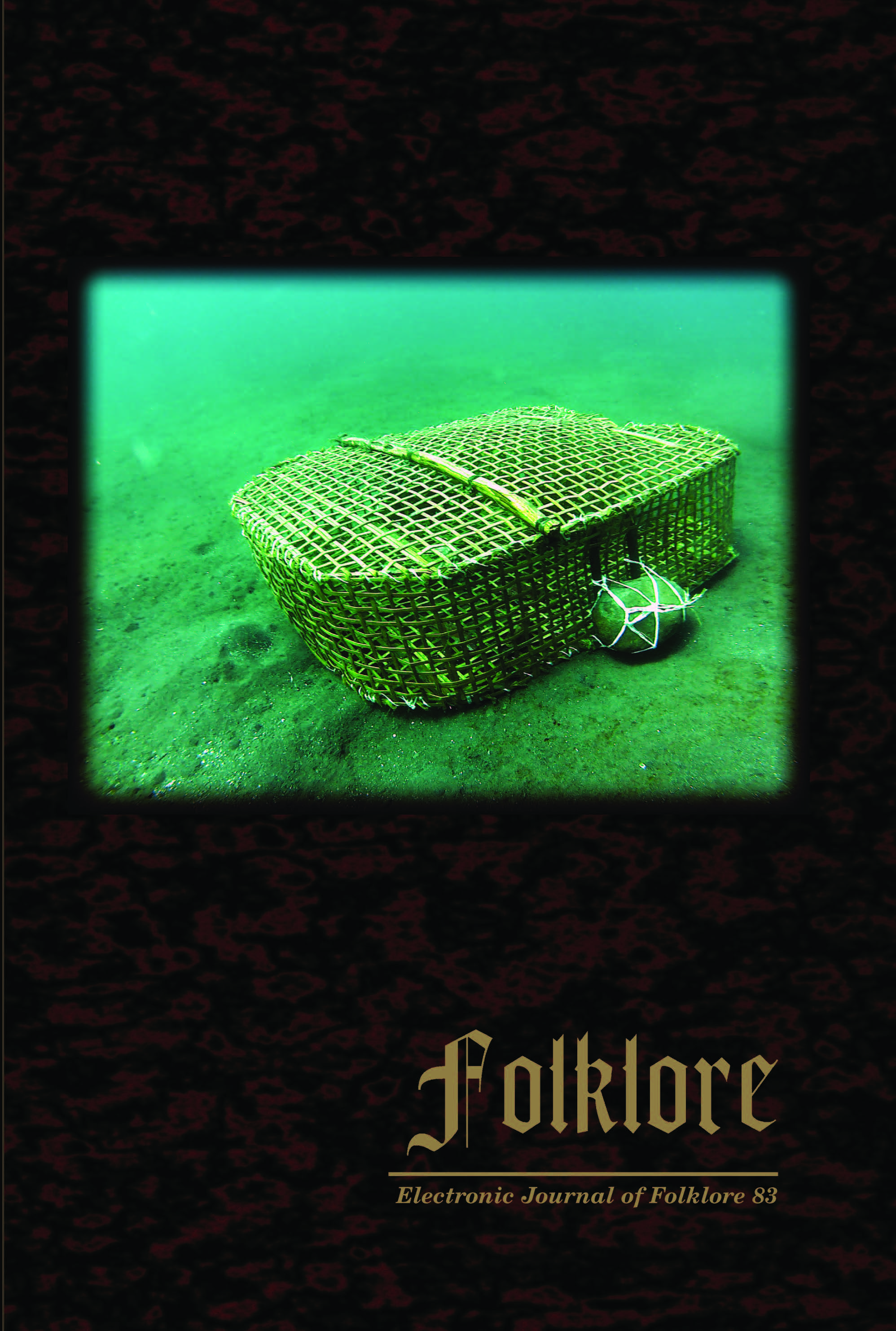
The paper focuses on the way the notion of trauma functions and is justified in the contemporary discourse on history. The author refers to the works of Aleida Assmann and examines the critique brought forward against memorial culture. Deconstructing Assmann’s argument, the author concludes that there are two levels of discourse that support and justify each other: the level of fact and the level of value. The first one deals with the problem of traumatic events and expanding memory about them, which is explained as a change of time regime. The second one deals with the ethical turn that made the change of the time regime possible. To analyse historical trauma, the article suggests breaking the connection between these two levels and examining their foundations separately.
More...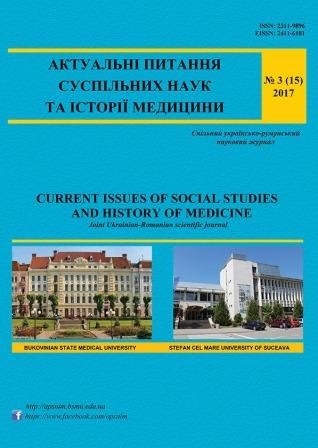
The purpose of the research is to study the influence of methodological pluralism as a meta-approach on the formation of modern historical science; to examine the role that diverse approaches played in the scientific study of the past; to demonstrate the importance of a multi-vector view of history as an integral part of the study of the past. The relevance of the research: these are interdisciplinary interactions between both socio-humanitarian and natural sciences. The consequence of this is the emergence of the phenomenon of methodological pluralism as the basis of modern historical science. Conclusions: in the process of research we discovered that diverse methodological approaches influence the historical science, which ultimately leads to the emergence of the new directions in historical knowledge. Research methods: analytical and synthetic, inductive and deductive, comparative approach. The novelty of the article lies in the analysis of the potential of methodological pluralism in the discourse of post-classical historical science. The productivity of using modern interdisciplinary approaches in the study of processes that have taken place in the past is substantiated.
More...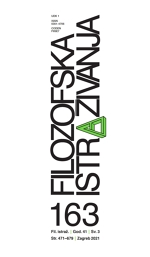
The paper establishes a correlation between nihilism and history from the premise of the end of metaphysics in the age of the technosphere. In presenting the genealogy of the postmodern turn in contemporary philosophical thinking, the author critically deals with Vattimo’s thesis that Heidegger’s notion of overcoming metaphysics (Verwindung) is the key to understanding postmodernity. Despite its close proximity to Nietzsche and Heidegger, it is undeniable that the main notion must be derived from late Wittgenstein’s thinking, as Lyotard did in his analysis of the “postmodern condition”. It is a notion of “language games” that introduces into consideration the relationship between the pragmatics of knowledge, the performativity of language and the event horizon. In this way, it will be shown that postmodernity cannot be any “new” epoch but rather a re-actualization of the condition determined by the rule of technoscience, cybernetics and plural patterns of culture in post-industrial society. Based on his previous analyses of this problem, collected in the books The Postmodern Game of the World, Identity Politics, The Posthuman Condition, and Technosphere I–V, the author believes that only extensive analysis and interpretation of Lyotard’s premises allows one to reach the right philosophical path to the answer to the question of the essence of nihilism in the face of Being, and the technosphere as computation, planning, and construction of the inhuman. In contemporary times, what is left of postmodernity is neither “telling stories” about the stylistic tendencies of the modern and neomodern, the avant-garde and the neo-avant-garde, nor, more so, the conflict of the universality and particularity of society and culture. All that remains is the feature of the unwavering “fate” of this nihilism of the technosphere: from the postmodern condition to the posthuman condition, thought is confronted with the challenge of an event that goes beyond anything seen in the history of Western metaphysics. When the image precedes the language and the writing to speaking, we find ourselves in a closed circle of turns and reversals of metaphysics. It is time to step out of this “vicious circle” in which the living becomes non-living, the Being becomes the information, the system of objects replaces society, and the human-too-human with inhuman as such.
More...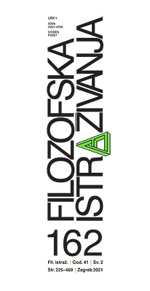
Unter der Annahme, dass der Orientalismus und Balkanismus nicht einmal rudimentär die reichhaltigen interkulturellen Beziehungen zwischen Europa und dem Mittelmeer erfasst, argumentiert die vorliegende Forschungsarbeit, dass es nötig ist, einen weiteren Diskurs in Ermangelung einer besseren Bezeichnung unter dem Namen Mediterranismus einzubeziehen. Darunter sind kulturelle Imaginationen des Mittelmeeres als philosophische und poetische Denkfigur der europäischen Schriftkultur zu verstehen. Die Hauptaufgabe ist dabei auf der Grundlage der Begriffsgeschichte in Fragmenten und der Deduktion der heuristischen theoretischen Hypothesen eine Rekonstruktion und kontrastive und komplementäre Komparation dieser drei Diskursformationen durchzuführen, unter der Einsicht, dass sie unter den Bedingungen der Moderne bei der europäischen Selbstbesinnung zugleich entgegengesetzt und miteinander verwoben sind. Daher enthalten sie eine ganze Reihe von perzeptiven, affektiven und kognitiven Gegensätzen und Widersprüchen, die gesondert in weiteren Forschungsarbeiten zu untersuchen sind.
More...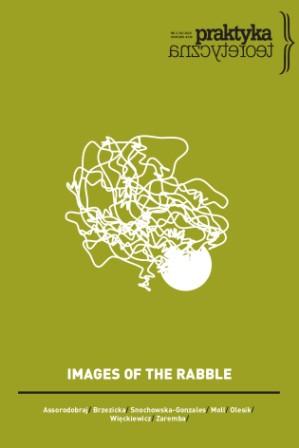
Review of Vincent Brown’s book Tacky’s Revolt. The Story of an Atlantic Slave War, The Belknap Press of Harvard University Press, Cambridge, MA—London 2020. (Łukasz Zaremba)
More...